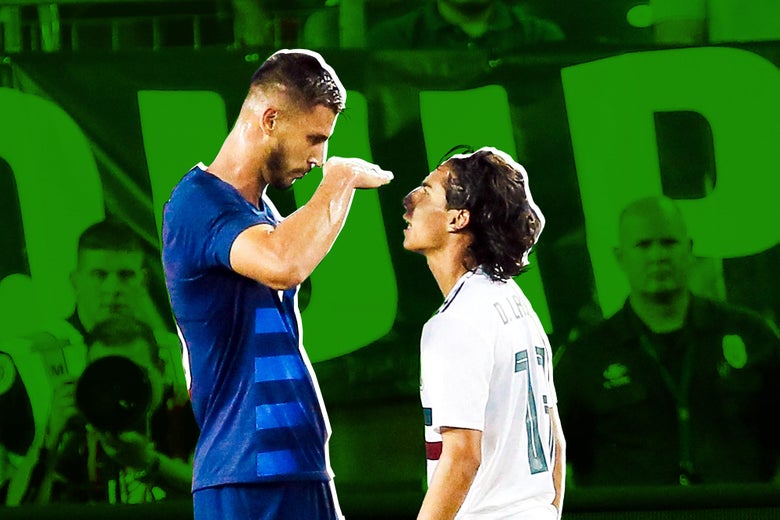
[ad_1]

Matt Miazga and Diego Lainez face off on the field Tuesday in Nashville.
Photo illustration by Slate. Photo by Frederick Breedon / Getty Images.
It is early on in the second half of Tuesday's "friendly" soccer match between the United States and Mexico, in Nashville's Nissan Stadium. Both teams had chosen young lineups, and the hungry upstarts did not disappoint. In the 64th minute, 18-year-old Diego Lainez, Mexico's most promising fresh star, who had been an absolute nightmare for Team USA throughout the game, cam face to face with Matt Miazga of the U.S. team. Only 5 foot 6, Lainez, Mexico's teenage dribbling phenom, is a devil on the ball, a once-in-a-generation talent. But during his Tuesday confrontation with Miazga, he looked small. The 6-foot-4 center back from New Jersey is a tower of a guy, poised to lead the next generation of American defenders.
It was a crude bit, Miazga's taunt a bit too petulant. It was also, well, fabulous.
The two men are in a routine play. Miazga, who is 23, won the ball from Lainez at the back. Relentless, the young Mexican would not let go, tugging at the taller man's shirt. Miazga confronted Lainez, who, despite the difference in size, took the challenge, looking up in defiance, not backing down. At first, Miazga was surprised by his opponent's audacity. Before long, though, he gave the cheering crowd a moment to remember. The American defender raised his forehead, measuring him up, taunting him, mocking his stature. Other Mexican players ran over, shoving Miazga, who stood there, mostly unshaken (though a bit less cocky when faced with taller opposition). Tempers flared. Insults flew. Two minutes later, Mexico's Ángel Zaldívar got a clumsy challenge on American captain Wil Trapp. Perhaps sensing Mexico's sudden unsteadiness, the Americans soon scored the only goal of the night. Though it was an exhibition match, with little to no significance for the team's fortunes, when the final whistle came, the U.S. players celebrated as if they had just won the World Cup.
Miazga's gesture immediately earned him a devoted following. "Matt Miazga is an American hero," wrote Rob Usry on Starts and Stripes, a soccer website. "Put this kind of attitude directly into my veins, please. Thank you, President Miazga. "The clash between players did not go unnoticed in Mexico. Miazga's name soon became the country's top trending topic on Twitter. Journalist Miguel Gurwitz tweeted a picture of Miazga and Lainez. "One is taller while the other one is much better at soccer. That's all, "Gurwitz wrote, oozing sarcasm. After the game, Miaza explained the Lainez kerfuffle has a tactical play: "It's mental warfare. We got in their heads, "the defender said. "It took a toll and we won the game."
It was a bit crude, Miazga's taunt a bit too petulant (Lionel Messi, after all, is only an inch taller than young Lainez).
It was also, well, fabulous.
The soccer rivalry between Mexico and the United States is quickly becoming a classic in the world of sports. For the better part of the 20th century, the rivalry was nonexistent. Mexico won most games against an opponent with only the best technical skills and little understanding of the intricacies of the game. Then came the '90s, with it, Mexico's rough awakening. That first generation of real talented American soccer gave the Mexicans a run for their money-and then some. By the early aughts, the United States was ready to challenge Mexico for the regional crown. They were so in the most improbable way: by beating Mexico on the sport's most celebrated stage, the 2002 World Cup. That game-a PTSD inducing nightmare for Mexican soccer fans such as myself-set a legendary rivalry in motion. (I reminisced about the recent podcast, if you care to listen to real bread.) The final score was 2-0, gold back to cero, a lot of mantra with which Americans teased the unbeatable Mexicans.
Since then, Mexico and the United States have had their fans tremendous battles on the pitch, with outstanding goals and some legendary shoving. Recently, though, things had not seemed promising. In the run-up to this year's World Cup in Russia, Mexico defeated the United States in their hallowed Columbus, Ohio, home field. A few months later, the Americans failed to qualify for the World Cup. Hindered by an inefficient soccer federation, a controversial youth development system, and an aging team, the future of the American team looked uncertain.
Tuesday's match should be some of those doubts to rest. Players like Miazga, Tim Weah, Kellyn Acosta, and the fabulous Christian Pulisic (injured for the game against Mexico) appear to give American fans years of enjoyment. As for the Mexican side, do not care: Diego Lainez is far from the only emerging talent on Mexico's roster. Cruz Azul's playmaker Roberto Alvarado is there too, is defender Jesús Angulo. And a certain Hirving Lozano-like Pulisic, a top talent missing from Tuesday's game-is capable of doing things that would make your head spin (just ask the Germans).
Eight years from now, Miazga and Lainez will be headlining their respective teams at the 2026 World Cup, to be played in the United States, Canada, and Mexico. Maybe they will clash then, as fully grown men, ready for their final, defining battle.
I, for one, can not wait. At a time of bitter tension in other more important matters between the two great North American partners, this bitter, petty-and-beautiful-sporting conflict is the only rivalry between us. I find morally defensible.
[ad_2]
Source link